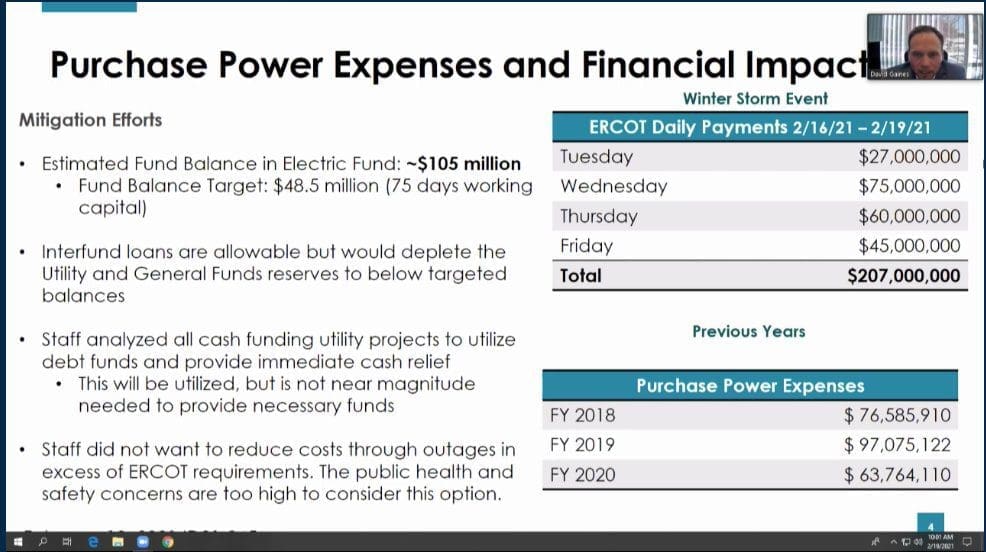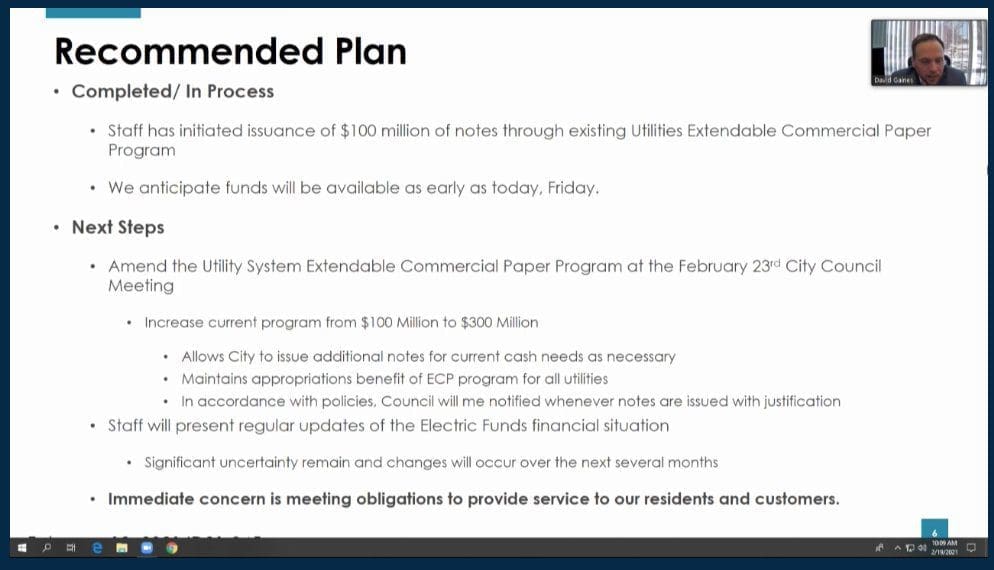As power continues to be restored statewide, questions have arisen of how high citizens’—and their local governments’—electricity bills will be after the City of Denton was hit with a power bill higher than its total electricity costs for the past year. Not all cities and citizens are in this situation, but it’s still unknown who will be similarly affected.
Early Friday morning, Denton Mayor Gerard Hudspeth announced the city council would hold an emergency meeting that day after learning the city was hit with a $207 million electricity bill for the past four days of usage.
Assistant City Manager and Chief Financial Officer David Gaines informed the city council that was far more than they had spent on electricity in a single fiscal year. Within the last three fiscal years, the most the city had spent was $97 million (in FY 2019).

It’s estimated the city only has about $105 million in its electric fund, and its target budget was $48 million.
Councilmember Deb Armintor asked how this will affect citizens’ electricity bills.
“It’s very difficult to be discussing that because [Gaines] doesn’t know the extent of the problem yet,” City Manager Todd Hileman replied, adding staff won’t have answers until the end of the month.
Plano Councilmember Shelby Williams also expressed concern about this.
“People should check their electric contracts, however, to see whether they have fixed rates or spot rates, as I’ve heard reports that spot rates around the states are skyrocketing,” he advised. “This is something the state Legislature will need to look at carefully.”
Other Cities
It is unclear exactly how many cities are affected statewide.
Fort Worth Councilmember Cary Moon and Dallas Mayor Eric Johnson’s office both informed Texas Scorecard their respective cities are not in the same situation as Denton.
Neither is Plano.
“The City of Plano has a fixed rate for electricity to city facilities,” Williams said.
Colleyville is also faring better.
“We are a part of—have been for like 20 years—the Texas Coalition for Affordable Power,” Mayor Richard Newton stated. “And that’s where a group of a bunch of different cities get together and work together to purchase power in advance.”
“[TCAP is] somewhat a political subdivision of the state,” explained Assistant City Manager Adrienne Lothery. She clarified it’s not exactly a local government, but a “political entity” run by representatives of the different city members.
“Denton has its own municipal electric utility; Colleyville does not,” she said. “Colleyville buys energy just like any other commercial user, but we have some ability as a local government to work with other local governments to go straight to the wholesale market, which we have done through the organization that we belong to, which is TCAP.”
“Any city our size is going to be a customer, not managing our own electric utility,” she added. “That being said, there is a number of cities our size that will go out to market and work with various brokers that will promise them the moon and the stars, but we see through quite a bit of that and are very appreciative of our relationship with TCAP.”
Lothery, who previously served on TCAP’s board, said there are currently 89 TCAP members in North Texas and 166 statewide.
Denton’s Next Steps
At Friday’s emergency meeting, Assistant City Manager Gaines advised Denton council members and Mayor Hudspeth to use debt to get out of this predicament and said staff had already issued $100 million in commercial paper—90-day short-term loans—for immediate help.
“At this time, we don’t believe that will be enough,” he cautioned, going on to advise council members to, at their February 23 meeting, increase the city’s current commercial paper program for utilities from $100 million to $300 million.

Gaines also told council members the city can rollover the commercial paper for another 90 days if needed. “We also have the ability to refund those with long-term bonds,” he added. “I do want to highlight there are still significant concerns remaining.”
“Is there any indication of state or federal government helping out (financially) cities dealing with this particular issue today?” Councilmember Armintor asked. “They’re monitoring,” Mayor Hudspeth replied.
Concerned citizens may contact their local city council member to learn their city’s specific situation.





